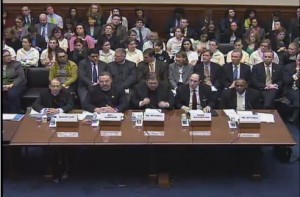Posts Tagged: rights
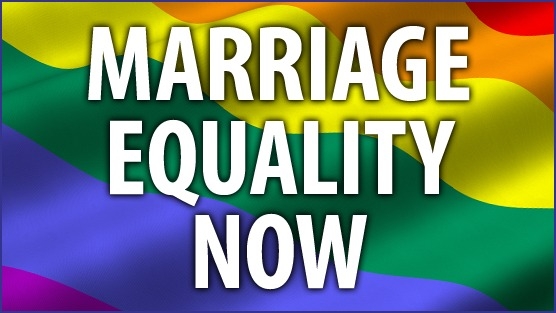
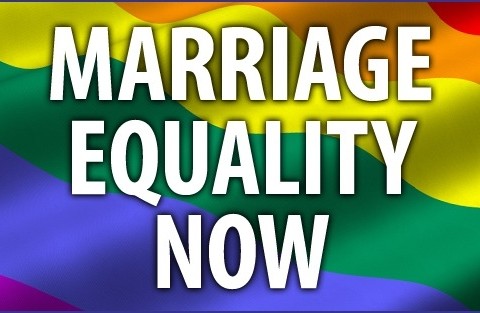
Curve Magazine: Why Marriage Equality Needs Tradition Reform
The Feminist Bride in Curve Magazine: “With a majority of states maintaining their marriage bans, 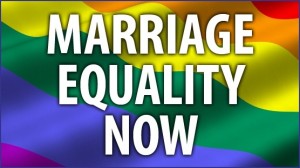 isn’t it crucial to examine all avenues to speed date this process? Pursuing change through legal civil action is not enough. The social traditions within Western wedding culture are extremely influential when it comes to government’s regulation of marriage. This is when tradition is at its most dangerous. Social traditions have often created civil laws, such as protecting domestic abusers, discriminating against out-of-wedlock children and preventing women from voting if they didn’t share their husband’s name, and prohibiting interfaith and interracial marriage. Same-sex marriage is no different. If common social practices can influence laws, isn’t it in the best interest of the LGBTQA community to reform traditions?” To read the rest of the article click here.
isn’t it crucial to examine all avenues to speed date this process? Pursuing change through legal civil action is not enough. The social traditions within Western wedding culture are extremely influential when it comes to government’s regulation of marriage. This is when tradition is at its most dangerous. Social traditions have often created civil laws, such as protecting domestic abusers, discriminating against out-of-wedlock children and preventing women from voting if they didn’t share their husband’s name, and prohibiting interfaith and interracial marriage. Same-sex marriage is no different. If common social practices can influence laws, isn’t it in the best interest of the LGBTQA community to reform traditions?” To read the rest of the article click here.
Jesus Recruits Sarah Silverman to Spread his Word on Abortion
There’s a lot of things I’d ask Jesus if I met the guy in person, like why curse some people with not liking cilantro, what would his Cliff game choices be if I gave him Oprah, Psy and Steve Buscemi and what are his thoughts on Lena Dunham’s constant nudity in Girls? But kudos to Sarah Silverman who dared to ask, “Jesus, when does life begin?”
In a random late night bootie call visit, Jesus approached Sarah to be his spokesperson. He was feeling pretty bummed about how people use his name for intolerance and oppression. After a NCIS marathon, seems Silverman took J-Bones up on his request and started to share the harsh reality of women’s access to reproductive rights, i.e. abortion. “Comedy-expert,” Laura Ingraham may not have appreciated the banter with Jesus, but I found Silverman’s straightforward historical context and tell-it-like it is storytelling refreshing and captivating. I also loved how she showed what a double standard it was to legislate vaginas but not penises. And to give our own fun fact, Oklahoma state Sen. Constance Johnson (D) actually tried to get this penis probe added to the “personhood” movement, which gave all eggs and semen the same rights as American citizens to make a point about how skewed legislature controls women’s bodies but not men’s.
What’s even better is that Silverman also asks you to carry on the word of Jesus by signing up with www.LadyPartsJustice.com to keep up to date on the level of personal pussy power in the US. There will even be a series of events through “V To Shining V” throughout the country where women can come together on these issues. So thanks for setting the record straight Sarah, oh and by the way – awesome shirt.


Happy President’s Day to All The Past Female Presidents! Oh Wait, There Are None.
Between Republican Presidential Candidate’s Newt Gingrich’s delightful views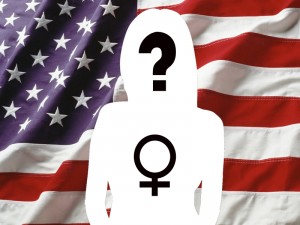 and treatment of women, people attacking Obama on his legislation protecting women’s reproductive rights, the Susan G Komen vs. Planned Parenthood debacle, Sarah Palin, Michelle Bachmann and now the blatant exclusive male debate over women’s birth control, I get a really warm, fuzzy and inviting feeling when it comes to women’s place in politics.
and treatment of women, people attacking Obama on his legislation protecting women’s reproductive rights, the Susan G Komen vs. Planned Parenthood debacle, Sarah Palin, Michelle Bachmann and now the blatant exclusive male debate over women’s birth control, I get a really warm, fuzzy and inviting feeling when it comes to women’s place in politics.
So when I see the countless people celebrating this President’s Day weekend, I’m only compelled to celebrate the Monday I’ve been given off. There’s little cause for me to celebrate. Out of 44 presidents (and 55 available terms), not one has been a woman. A few have come (sorta) close though. In 1872, Victoria Woodhull was the first woman to run for president. Back then women did not even have the right to vote in federal elections yet and wouldn’t until 1920 – 52 years later. The female candidates between now and then have been few and far in between with no successful ones. A 2009 poll revealed only 55 percent think America is now ready for a woman president. Despite Americans seeing themselves as a world leader, we actually rank 90th in the number of women in our national legislature. And given the US’s history of world politics we’d be embarrassed to realize what other countries are ahead of us such as Cuba (ranked 6th) and Afghanistan (30th). The figures are no more encouraging for other political positions. Overall, for dominating 51% of the total US population, women only account for 17% of the seats in Congress. And our numbers are declining. At this rate women will not reach parity for 500 years!
I’m happy to think that a lot of this birth control debate and the blatant misogyny we see occurring in our reproductive fate is encouraging women to speak up after too much silence. I haven’t seen such overwhelming support for women since the 1990s. The personal may be political, but in the public realm most of us have been keeping the personal private and that is clearly dangerous. We’ve naively assumed that the personal will be protected. Without our direct involvement in our own fate we can’t assume the progress of women will continue. Below is a list of where women in positions of political leadership currently stand. The statistics are scary.
On this President’s weekend, I encourage women to think about their own involvement in the political process. Are you voting for candidates that believe in women, that will fight for ALL women and include women on their own offices? What is your own involvement in politics – instead of being disgruntled at the our current state of affairs, why aren’t you throwing your hat into the ring? Many of us grew up in a generation that taught women can be anything they put their minds too, yet few of us have followed up on that idea. We should recognize we hold all the same skill sets, will and strength to run and hold positions of leadership as any other candidate. Why aren’t we more involved then?
Sorry to copy straight from the pages of the WCF Foundation, but I found the statistics so compelling, eye opening and straight forward that it just seemed better to give them a tip of the hat on their work and a little plug for their non-profit (Click here to donate to their “She Should Run” Campaign). Here is their mission statement: “WCF is dedicated to helping women build the skills and infrastructure they need to become more effective leaders in public life. WCF Foundation conducts action-oriented research and pilots targeted programs that prepare women to become more politically active, increase their engagement in key democratic processes, and ready them for public leadership roles. At WCF Foundation, we not only identify barriers to women’s political equality – we find solutions.” I would also like to point out The White House Project that encourages women’s leadership in all sectors. Their mantra of “Add Women, Change Everything,” speaks exactly to the power of including women.
FAST FACTS ABOUT WOMEN IN POLITICS
Where We Are: 2010 Election Update
For the first time since 1987, the United States made no progress in electing more women to Congress.
- Democrats lost control of the House of Representatives, bringing an end to Represenative Nancy Pelosi’s historic leadership role as the first woman Speaker of the House. (Source)
- 3 women committee chairs—Rep. Louise Slaughter on the Rules Committee, Rep. Nydia Velazquez on the Small Business Committee, and Rep. Zoe Lofgren on the Standards of Official Conduct Committee—will also lose their leadership positions as the Democrats become the minority party in the House. (Source)
- The number of women serving in the Senate will remain level at 17. The number of women serving in the House of Representatives will drop for the first time since 1979. (Source)
- 10 incumbent Democratic Congresswomen lost their seats. No Republican women in the House lost their seats. One incumbent woman Senator lost her seat. (Source)
A few pieces of good news in an otherwise dreary election cycle for women:
- Hawaii elected women to both of its U.S. House seats, making it the first state with more than one congressional district to have all-female representation in the House of Representatives. (Source)
- Five women of color were elected to the House of Representatives, including WCF-Endorsed Terri Sewell, who will become Alabama’s first African-American Congresswoman. (Source)
Women are still under-represented at all levels of government.
- Women hold only 17% of the seats in Congress. (Source)
- Only 22% of all statewide elective executive office positions are currently held by women. (Source)
- State Legislatures are only 24% women. (Source)
- Only 6 out of 50 states have a female governor. (Source)
- The United States trails behind much of the world—ranking 90th in the number of women in our national legislature. (*Note: The U.S. is listed as 73rd, but after accounting for tied rankings of other countries, the ranking for the U.S. is 90th. Source)
- On average, male cabinet appointees outnumber women cabinet appointees in our states by a ratio of 2 to 1. (Source)
- 50% less women than men consider of running for office. Of those, 30% less actually run, with only a fraction seeking higher office. (Lawless, Jennifer and Richard L Fox. It Takes a Candidate: Why Women Don’t Run for Office. New York: Cambridge UP, 2005.)
- Women constituted 54% of voters in the 2008 elections, but only 24% of state legislators. (Source)
- Women of color represent only 4% of Congress and 23% of women Members of Congress. (Source)
Facts on women of color in elective office
- Of the 89 women serving in the 112th US Congress, 24 or 27% are women of color. (Source)
- From those, 13 are African American, 7 are Latina, 4 are Asian American and none in Native American.(Source)
- Of the 68 women serving in statewide elective executive offices 10, or 14.7% are women of color. (Source)
- Women of color constitute 4.7% of the 7,382 state legislators. (Source)
Why We’re Here
Parties can make or break a woman candidate:
- About one-third of women say that someone tried to discourage them from running—most often an officeholder or political party official. (Source)
- Women are more likely than men to say that party support was very important to their decision to run. Women are also more likely to cite their party, rather than an organization, as the most influential source of encouragement for their candidacies. (Source)
Gender Stereotypes still play a role:
- Both male and female voters are much more judgmental about the appearance and style of a female candidate than of a male candidate. Although all candidates are judged on these attributes to some degree, women have a more difficult challenge in convincing voters to judge them on their merits rather than on their appearance.(Source)
- If a woman candidate is unmarried, both male and female voters perceive her as less likely to share their own family values. (Source)
Money Counts:
- The top three women who enjoyed incumbency advantage in 2008 raised approximately $33 million—$16 million less than the total for the top three male incumbents. (Source)
- In highly competitive races, the gap between the top-raising female and male U.S. Senate challengers in 2008 was almost $14 million (Senator Kay Hagan raised $8.5 million and Al Franken $22.5 million), which is $8 million more than the difference in 2006. (Source)
- Male U.S. House incumbents raised on average $196,281 more than women in 2008. Only five of the 1303 candidates relied on women for more than half their contributions. (Source)
- Most women believe that it is harder for female candidates to raise money than male candidates, while the overwhelming majority of men believe it is equally hard for both men and women. (Source)
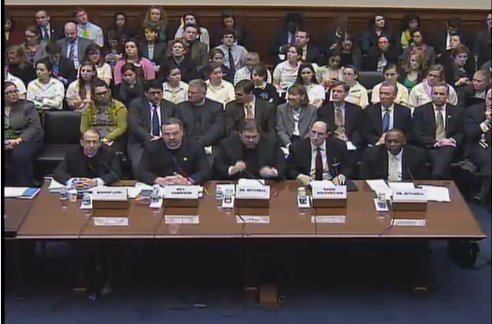

Opinion: On Denying Birth Control Coverage and Not Inviting Women to the Table
This news of a Republican panel of five men and NO women convening to discuss denying birth control coverage struck a sour chord. It saddens me because I don’t want men dictating how I treat my body, and we women are not second-class citizens who are unable to think for ourselves. (One woman did show up to testify, but was shown the door.) But it also saddens me because denying this coverage commits an entire sector of our population to an endless cycle of poverty. It’s amazing how making a little pill (or other more reliable options) available to all, regardless of income, can make a difference in the educational level and the standard of living of our entire country.


Hillary Clinton United Nations Speech: ‘Free and Equal in Dignity and Rights’
An amazingly powerful speech that should be shared and heeded. Hillary Clinton speaks to the United Nations about how LGBT rights are human rights. Clinton explained that LGBT legitimacy does not differ from the civil rights issues that other groups experienced throughout history. She stresses that to make sure LGBT members are not discriminated or abused we all need to recognize the need to accept and protect – that they should be as free as the rest of us to live in peace, expression and lifestyle without condition.
“It proclaims a simple, powerful idea: All human beings are born free and equal in dignity and rights. And with the declaration, it was made clear that rights are not conferred by government; they are the birthright of all people. It does not matter what country we live in, who our leaders are, or even who we are. Because we are human, we therefore have rights. And because we have rights, governments are bound to protect them.”
“I am talking about gay, lesbian, bisexual, and transgender people, human beings born free and given bestowed equality and dignity, who have a right to claim that, which is now one of the remaining human rights challenges of our time. I speak about this subject knowing that my own country’s record on human rights for gay people is far from perfect. Until 2003, it was still a crime in parts of our country. Many LGBT Americans have endured violence and harassment in their own lives, and for some, including many young people, bullying and exclusion are daily experiences. So we, like all nations, have more work to do to protect human rights at home.”
“It is violation of human rights when people are beaten or killed because of their sexual orientation, or because they do not conform to cultural norms about how men and women should look or behave. It is a violation of human rights when governments declare it illegal to be gay, or allow those who harm gay people to go unpunished. It is a violation of human rights when lesbian or transgendered women are subjected to so-called corrective rape, or forcibly subjected to hormone treatments, or when people are murdered after public calls for violence toward gays, or when they are forced to flee their nations and seek asylum in other lands to save their lives. And it is a violation of human rights when life-saving care is withheld from people because they are gay, or equal access to justice is denied to people because they are gay, or public spaces are out of bounds to people because they are gay. No matter what we look like, where we come from, or who we are, we are all equally entitled to our human rights and dignity.”
Click to here to read full transcript.
More Feminist Bride articles related to gay rights:
A Testimonial on the Families Gay Marriages Builds
Diane Savino On NY Gay Marriage Bill: ‘We Have Nothing To Fear From Love And Commitment’ (VIDEO)
Petition Asks Bert And Ernie To Get Married On Sesame Street
Michele Bachmann Gets “Flippy-Floppy” on Addressing Gay Rights Debate
Military gay couples still won’t enjoy benefits
NJ Has A New Situation for Gay Marriage Rights
Woman’s Pro-Gay Shirt Deemed Offensive at Dollywood, Dolly Parton’s Theme Park
Miley Cyrus Inks Wrong Symbol In Support Of Gay Marriage
Maryland’s Gov. Martin O’Malley Pushes for Gay-Marriage
Hair’ Celebrates Same-Sex Marriage With On-Stage Weddings

